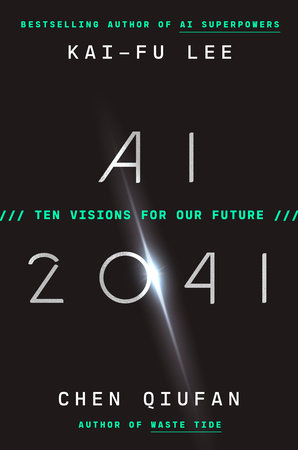Where will today’s technologies lead us over the next 20 years, and what will an AI-infused world look like across the globe? Sinovation founder and AI thought leader Kai-Fu Lee and breakout sci-fi author Chen Qiufan (aka Stanley Chen) make an educated guess in “AI 2041: Ten Visions for Our Future” a set of 10 stories and 10 essays exploring and explaining the potential and pitfalls of AI.
After reading the book — I’ll be publishing a review shortly and TechCrunch recently posted an excerpt — I talked with Lee and Chen at TechCrunch Disrupt 2021 about how the collaboration came about, how their points of view coincided and differed, and why they think the future will be how they describe it.
(Quotes have been lightly edited for clarity.)
Lee and Chen found each other a few years ago — one a successful thought leader and entrepreneur in AI, the other an author whose incisive depictions of near-future dilemmas earned him international acclaim. They decided to collaborate on a hybrid work that would have narratives born out of informed speculation and expository pieces illustrated by narrative.
“It’s really to tell the whole story of AI, because AI is so important. Everyone should know more about it, but it’s also a little bit intimidating because it sounds technical,” Lee told me. “And what better way to tell the story than by truly telling stories?”
“We knew each other briefly back in the day in Google, and I was always thinking about writing a book about future technology, based on very specific science, facts and theories,” Chen said. “But without Kai-Fu, I couldn’t do that, because I’m not the expert in the domain.”
The result of their collaboration is “AI 2041”: Ten stories by Chen set in the titular year, all over the world, with people from all walks of life encountering AI in the many ways that the authors think it may come to shape society over the next two decades. Each story is followed by an explanatory essay by Lee that goes into the technical aspects and why they might lead to that future.
The stories are independent but happen in something like a shared world, each illustrating a potential application, conflict or change in thinking that AI could lead to. Importantly, the AI is recognizable as an evolution of existing technologies.
“We started with a framework of four things,” said Lee. “One is I wanted to cover around 15 technologies in 10 stories. I also wanted to order them so that they go from easy to hard, so it’s kind of like an AI textbook — you know, you learn it by reading stories. Then we both wanted it to be in different industries, like education and healthcare and so on, to show that AI impacts everywhere. And then lastly, Stanley wanted it to be in 10 different countries.”
Take for example the story “Gods Behind the Masks.” It concerns a talented deepfake creator working out of Lagos who knows the ins and outs of generative adversarial networks, image inspection, media pathways and so on. He is tasked with creating a video of a long-dead celebrity that fools not just people watching it, but the hosting service’s automated scanners, the government’s facial recognition algorithms and all the rest — but he begins to suspect there’s an unsavory motive behind it all (I won’t spoil the rest).
Following the story is Lee’s essay on GANs, facial recognition and deepfakes explaining the concepts and then exploring the risks and benefits in a non-narrative way. It helps ground the stories as possibilities that may become real, not just imagined situations.
I asked Lee how he managed to balance realism and imagination in the matter of how technologies, like today’s not-entirely-convincing deepfakes, might develop and change over 20 years.
“So from the technology side, going to decades ahead is not as hard as people think,” he replied, rather in-character for someone who is famous for anticipating and helping create the near future. “If you think about trends, we can predict the speed of computing, the amount of data storage, we can project the quality, whether it’s deepfakes or conversational AI, and the way that they have been improving. It’s nice that AI is a technology that happens to scale with more computing and data. So it is something you can project and say, okay, it got 2% better than last year, 3% better than the year before. So in 10 or 15 years, how well will it perform?”
For technologies that don’t work yet, assumptions need to be made, but along similarly informed lines. Lee said his predictions are “probably about 80% accurate … that means 80% of what I predict should be more or less on target in a, you know, 10-, 15-, 20-year time frame.” He’s giving himself a lot of leeway, but it’s still quite a claim.
Chen and Lee both wanted to take an optimistic view of things. They didn’t want to say that AI will produce no problems or solve them all, but that it will increasingly just be part of the usual human problems and perhaps add something new and good.
“To me, most of science fiction, literature or movies about AI is usually dystopian, right? Like ‘Terminator,’ ‘Ex Machina,’ ‘2001: A Space Odyssey.’ I think we’ve created enough monsters in this area,” said Chen. “Right now I think we need something more positive, more bright. In reality we need a lot of hope … it’s so depressing nowadays. I think this is our responsibility … if you want to create the future we want to live in, or let our children live in, we’re supposed to imagine that first.”
The exception to that rule is probably the story “Quantum Genocide,” which concerned, among other things, autonomous weapons. Here, the pair didn’t pull any punches or suggest anything but bare survival. Lee said this was purposeful. “My view is that autonomous weapons are the most dangerous existential threat that AI poses to humanity. I wanted the story to be darker so that we can wake up and see how dangerous it is,” he said.
Geopolitics and “AI superpowers,” as Lee has put it, play small roles in the stories, and Chen explained this as part of his emphasis on the universality and diversity of the tech’s applications.
“That’s why we set all 10 stories in 10 different countries and cultures,” he said. “I think AI is supposed to be for everyone, not just for the AI superpower countries, for those privileged enough to use the technology. It’s supposed to be a service for everyone. So I think unless we have this kind of common sense, and engineers and tech giants and policymakers to make sure how it will be equally beneficial for everyone, we will be working toward that very dangerous place, like autonomous weapons and AI superpowers [having] power over developing countries and poor people.”
One trend I noticed in the book involved people using various methods to trick the everyday AIs they encountered. I asked Lee if he thought this would become commonplace.
“I think we’re being tricked by AI right now,” he countered. “It is building a great objective function optimizer that helps the likes of Facebook and Google optimize their profits or revenue or click-through, and showing us content that causes them to make money. As long as AI continues to single-mindedly optimize one thing, it becomes a cat-and-mouse game by different programmers — like in deepfake and the people who use it and are watched by it. People don’t optimize one goal — you know, you should be able to build an autonomous vehicle that gets you from place A to place B, subject to safety, or a way to show people videos they like to watch, provided these videos help them grow. So ultimately I’m hopeful.”
Lastly, Chen was pleased with the ascendance of Chinese authors on the international stage and is excited about taking on new global collaborative means of interpreting and promoting these ideas — including the latest hot (perhaps too hot) tech, NFTs.
“I think after ‘The Three Body Problem’ [by Liu Cixin] and ‘Folding Beijing’ [by Hao Jingfang]. A lot of Chinese science fiction authors’ names and works will be known across different countries and cultures,” he said. “But fiction and literature is just one format. I think the most influential formats are movies, TV and games, and NFTs and metaverse right now are a big concept across the world. I’m happy to announce right now we’re partnering with TR Lab, a new NFT art discovery platform, to invite leading digital artists to create some NFT artwork inspired by the 10 stories in the book. I think it’s a first of its kind cross-medium collaboration.”


